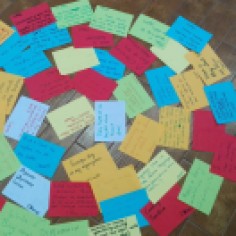After learning what is an EVS (or now, ESC – European Solidarity Corps volunteering activity), now, let’s focus on one of the first big moment of the EVS experience : the On-Arrival training !
What is an on-arrival training?
Well, I talked a little bit about it already in this article. An on-arrival training is when, after arriving in your new country, new city, new lifestyle as a fresh European volunteer, you are dearly invited to join some kind of a four days seminar to check how it’s going so far. During those days, you will learn about…
- non-formal education
Which is not 1) formal education (the one you get in school) and not either 2) informal education (the one you get by chance or mistake). Non-formal education is when you are in a learning space, so you do know you are here to learn something, but it’s not formal, so nothing like a classroom or so. For example, in non-formal education, participants and facilitators usually sit in a circle so everyone can see each other and communicate easily. Also, very often, visual facilitation (little drawings illustrating what’s happening) can be used so the information can be processed in a more playful and easily understandable way. In non-formal education, you are invited to use the space allocated to the group during the seminar : it means you will probably have a colourful timetable on the wall, that you can decorate the room with your ideas and inspiration, that you will have little games between each break to wake up a little bit (they are called « energizer« ), and that you will also probably do moving activities such as moving debate to quote just one.
- non-violent communication and conflict resolution
It can happen that when you start your volunteering activity in a new environment, especially in a foreign country, your expectations are not being met at the beginning. You can have too much work, not enough work, have difficulties with your hosting organization. Maybe your accomodation doesn’t suit you, or maybe you hate your colleagues. Those are all very normal problems for ESC volunteers, especially at the beginning of their experience. Therefore, the on-arrival training is meant to be a place where you can share those difficulties, and get some tools on how to deal with the situation. Basically, how to speak to people so your problem will be solved (hopefully) without getting offensive, even when it’s not on purpose. Just to give an example, everybody has its own response to brutal honesty, and those responses can vary even more because of cultural differences, social background and so on. So, it’s important to learn how to communicate in a friendly, non-offensive way, in order to have your message received. It’s not natural for everyone, it can be a skill, and, believe me, an important one.
- sharing and meeting new people

The OAT is also a moment where you can meet volunteers who are involved in other projects, maybe around your area or your topic or maybe that have nothing in common. For volunteers in Belarus, we therefore meet people who are living in Ukraine or in Moldova, and who works for all kind of things, from dog shelters in the Moldovan countryside to a youth center in Eastern Ukraine to human rights awareness in Chisinau. Many moments of the training are dedicated to sharing experiences about the location, the projects, the personal reasons of doing an EVS, and it’s a great moment to compare your situations and try to support each other in your difficulties. There are also many informal moments, mostly during the evening, when you can just have a beer together, watch a movie, play some games or compare your respective lunch and dinner time in your home countries. I would add that it’s a good time to make friends, that you will be able to visit in the future, during or after the volunteering experience. It’s always nice to have a good international network for cheap holidays and fun! and for work, of course.
- And, last but not least, if you are lucky, you can expect great location and nice food 🙂
To recap, the OAT is a very important moment that can answer some very down-to-earth questions you may have about your project: what are my rights and duties as a volunteer, how does mo pocket money is calculated or what is a mentor and do I have one? But also more personal and philosophical topics, such as what do I want to achieve during this year, what are my motivations as a volunteer and basically, what am I doing here? It’s also a great time for fun and self-reflection so make sure you enjoy this moment!

If you have any question, or want to share your impressions during the OAT, you can write me at the page « Allo Ponpon » – photo at a vintage phone booth in Lviv, Ukraine 🙂
Si vous avez des questions, ou souhaitez partager vos impressions pendant votre OAT, rendez-vous sur la page « Allo Ponpon » – photo avec une cabine téléphonique vintage de Lviv, Ukraine 🙂










2 réflexions sur “EVS #2 – The On-Arrival training”